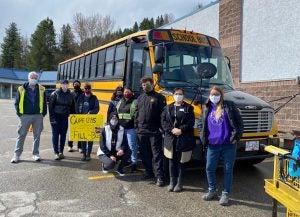 TRAIL—Acting on greater community need brought on by the pandemic, CUPE 1285 members—K-12 support workers in Trail, Castlegar, Rossland and Fruitvale—held a successful food drive this past weekend to support local food banks.
TRAIL—Acting on greater community need brought on by the pandemic, CUPE 1285 members—K-12 support workers in Trail, Castlegar, Rossland and Fruitvale—held a successful food drive this past weekend to support local food banks.
CUPE 1285 member Jaydeen Ashton, an education assistant at Stanley Humphries Secondary and the event organizer, said that the food drive’s success was beyond her expectations. “We saw smiles and energy, people being so generous that the organizations we donated to were overwhelmed, happy and grateful,” said Ashton. “It does your heart good.”
The event was also a rare opportunity for CUPE 1285 members to reconnect in person while following safety protocols in an outdoor environment, including the use of masks and hand sanitizer.
CUPE members braved the elements through a windstorm, snow, hail and rain, collecting donations of non-perishable items while connecting with local residents. The CUPE event was wholeheartedly supported by the community from the folks who came out to donate; to CUPE members, teachers and school administrators who collected food donations ahead of the drive; and local businesses.
CUPE 1285 President Heather Skarbo praised her members for their commitment to community and the hard work of organizing and coordinating the food drive. “Members really stepped up to support this good cause,” said Skarbo. “I’m so proud of everyone for helping our community. It was such a positive way to get our local out there and demonstrate how much CUPE members care.”
The drive was held out of two school buses provided by School District 20 (Kootenay-Columbia) in Castlegar and Trail. Organizations were asked ahead of time what their clients’ needs were and the buses were used to organize donations for each group accordingly. The Local had cash boxes at both sites for gift card and cash donations. At the end of the day, recipient organizations filled trucks and SUVs with donations.
As well as volunteers, community members, and local businesses, local labour organizations supported the CUPE event, including the Kootenay District Labour Council and Kootenay Columbia Teachers Union.
“I was exhausted but energized when I saw how many we were able to help as a result of that one day,” said Ashton. Organizations supported by the drive were Trail Salvation Army/Kate’s Kitchen, the United Church food bank in Trail, the Beaver Valley food bank, Castlegar Harvest food bank, the IRIS senior’s program in Castlegar, and the meals program of the New Assembly Church in Castlegar.
Visit the CUPE BC gallery to view photos.
